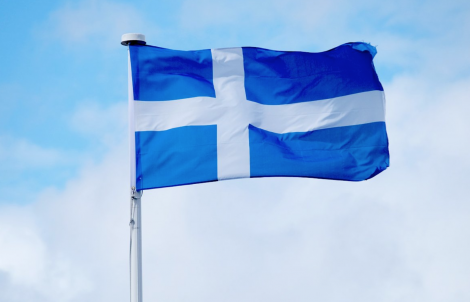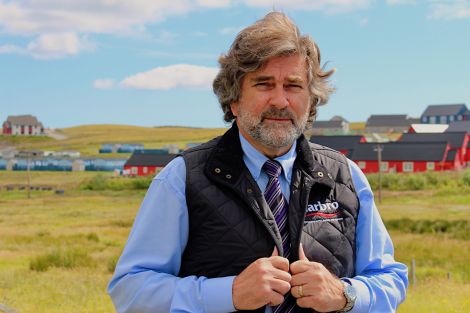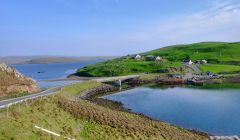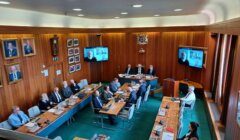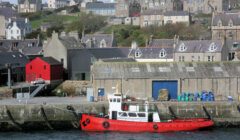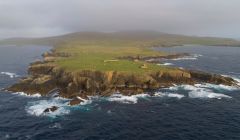Council / Self-determination motion a ‘first small step towards a brighter future’
“THE AIM of this is not to get more powers for the SIC but to explore replacing the council with a new system of government which controls a fairer share of our revenue streams and has a much greater influence over our own affairs”.
That is the view of councillor Duncan Anderson following the significant vote yesterday afternoon as elected members sought to explore the options for achieving political and financial self-determination.
It may sound a little odd that councillors resoundingly voted for something which could, in theory, herald the end of Shetland Islands Council – but elected members were keen to stress the desire for change is about Shetland as a whole.
Members voted 18-2 in favour of a motion that has been proposed by nine councillors, including leader Steven Coutts and convener Malcolm Bell.
It stemmed from growing frustration over the ever growing trend of centralised decision making and reduced government funding for essential services such as inter island ferries.
So what is next? Those in favour of the motion were keen to stress that it was merely a “first step” in a long process of evaluating what options are out there.
Any constitutional change would be decided at the ballot box, the meeting heard.
The council will now seek discussions with the UK and Scottish governments on what options there might be for greater powers.
Whether these bear fruit, however, remains to be seen.
It has certainly captured the imagination of the politically minded online, with ‘Shetland’ trending on Twitter in the UK on Thursday.
The motion is not the first foray into the concept of more powers for the isles, with the Shetland Movement gaining popularity in the 1980s and 1990s before losing steam.
Self-governing Faroe, to the north west of Shetland, has often been used as an example of how things could be run.
Become a member of Shetland News
In 2015 autonomy group Wir Shetland was formed but it remains inactive.
Councillor Anderson, who was a member of Wir Shetland, was a driving force behind the council’s motion.
“I was proud to second the motion in the council chamber which will embark the council on a process of seeking more financial and political powers for these islands,” he reflected after the vote.
“This is not ‘rhetoric’ as has been claimed by some quarters. Many in Shetland currently feel powerless. As an elected representative, I often feel frustrated by the erosion of powers, ring fenced funding and lack of resources we face.
“Local authorities endure much of the publics blame but are often a victim of external decision making or legislation.
“This situation seems to be getting steadily worse. Give Shetlanders the powers, resources and responsibility to manage our own affairs, as many other island groups do successfully.
“There are many able and competent people in Shetland, I expect the ability to make real change may encourage more of them to get involved in politics.
“I have no doubt in our ability to effectively govern ourselves, we just need the opportunity and the will. I am delighted seventeen of my colleagues were willing to support the motion. I believe this can be the first small step towards a brighter future.”
There are many facets in the mix which may play out over time – oil, fishing, possible Scottish independence.
The SNP’s sole councillor Robbie McGregor supported the motion, but called for all options to be explored.
Only two councillors, Stephen Leask and Ian Scott, spoke out against it.
Leask proposed an amendment in opposition, saying it was “not the time or place” for what he called a motion for “autonomy lite”.
The Lerwick member said it was a time of limited finances and constraints on resources for staff, but he was left adrift when it came to the final vote.
The content of the motion, meanwhile, may mean different things to different people – with some members against the idea of full autonomy.
It is not an off-the-cuff initiative, though, with a motion having been in the works for months.
The Scottish Government not covering the council’s full request for ‘fair’ funding for running its internal ferries over the last few years has proved to be a constant source of anger for councillors, and it is one thorny issue underpinning the motion.
There is also sense locally that initiatives like Our Islands Our Future – set up in the aftermath of the Scottish independence referendum in 2014 to give more powers to Shetland, Orkney and the Western Isles – have not lived up to its billing.
Leader Steven Coutts said things were at a “crossroads”, with councillors no longer content with just sitting back.
SNP ministers, as well as Liberal Democrat MP Alistair Carmichael, are supportive of the motion in principle.
Highlands and Islands MSP Maree Todd, from the SNP, said she expects councillors to stand “shoulder to shoulder” with the party if a second independence referendum is held.
Like the concept of Scottish independence, it remains to be seen what will come of Wednesday’s motion – but the political statement behind the move is clear for all to see.
Become a member of Shetland News
Shetland News is asking its many readers to consider paying for membership to get additional features and services: -
- Remove non-local ads;
- Bookmark posts to read later;
- Exclusive curated weekly newsletter;
- Hide membership messages;
- Comments open for discussion.
If you appreciate what we do and feel strongly about impartial local journalism, then please become a member of Shetland News by either making a single payment, or setting up a monthly, quarterly or yearly subscription.






